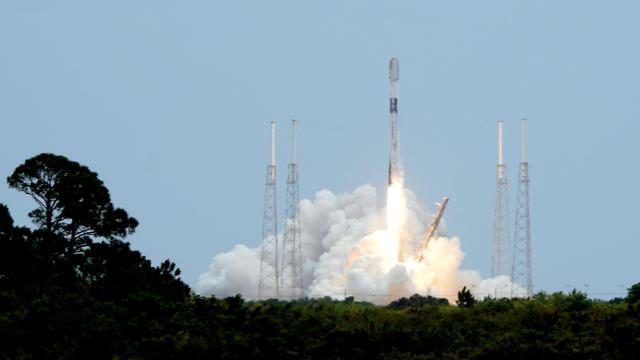In anticipation of SpaceX’s Starlink satellites posing as a threat, military researchers in China want their nation to be ready to disable, or perhaps completely destroy, the gigantic internet constellation. It’s an ominous possibility, but one easier said than done.
In a research paper published in China’s peer-reviewed journal Modern Defence Technology and reported on by the state-run South China Morning Post this past Wednesday, lead author Ren Yuanzhen, a researcher with the Beijing Institute of Tracking and Telecommunications, argues that the Chinese military should develop ways to counteract any threat posed by Starlink. The paper was freely available as early as yesterday, but as of today it appears to be taken down. However, a translated version of the article can be accessed here.
“A combination of soft and hard kill methods should be adopted to make some Starlink satellites lose their functions and destroy the constellation’s operating system,” the paper reads, citing “hidden dangers and challenges” to China. The researchers behind the recent paper also warn of Starlink going on the “offensive” and using the satellites’ ion thrusters to knock China’s spacecraft or satellites out of their orbits.
Elon Musk’s SpaceX is building out the Starlink satellite constellation in low Earth orbit, and it’s designed to provide high-speed internet to virtually any part of the world. The plan is to launch upwards of 42,000 satellites to orbit using the company’s Falcon 9 rockets, and so far about 2,300 functioning Starlink satellites have been placed in orbit.
“If you’re a part of any country’s military whose job it is to think about war in space, you see Starlink as a different problem,” astrophysicist Jonathan McDowell from the Harvard-Smithsonian Centre for Astrophysics told Gizmodo.
The main issues with the Starlink satellites is that there’s just too many of them, and so you would have to dispatch a tremendous number of anti-satellite missiles to destroy the entire constellation. Knocking out one or two, or even several dozen, won’t disable the entire system. What’s more, SpaceX would have very little difficulty replacing a few lost units. And as McDowell said, “replacing a Starlink satellite is cheaper than replacing an anti-satellite missile.”
China became extra wary of the constellation after two Starlink satellites nearly crashed into China’s Tianhe space station on two separate occasions in 2021. On both occasions, the space station had to move out of the way with Chinese astronauts on board.
The authors of the recent paper are concerned that SpaceX will soon overwhelm low Earth orbit and that the private company might assist the U.S. military in dominating this valuable swath of space. China’s military has also expressed its concern following Musk’s use of Starlink to support Ukraine during the ongoing Russian invasion. In March, Starlink began to provide internet connections for people in Ukraine after cell towers were damaged by Russian forces.
Earlier this month, the website affiliated with China’s Central Military Commission published an opinion piece that warned of Starlink’s reach. “In addition to supporting communication, Starlink, as experts estimated, could also interact with UAVs [Unmanned Aerial Vehicles] and, using big data and facial recognition technology, might have already played a part in Ukraine’s military operations against Russia,” according to the article, published in China Military Online.
During war, one strategy is to interrupt the enemy’s lines of communication, but that’s becoming a tall order in this era of megaconstellations. Moreover, and as McDowell explained, Starlink provides an inherent advantage for those who choose to use it. “I don’t think it’s seen as a threat, it’s seen more as an asset,” he told me.
Following his support of Ukraine, Musk was vocal about the potential for Starlink to be targeted. “If you attempt to take out Starlink, this is not easy because there are 2,000 satellites. That means a lot of anti-satellite missiles,” Musk said in an interview with Business Insider in March. “I hope we do not have to put this to a test, but I think we can launch satellites faster than they can launch anti-satellites missiles.”
The real threat, though, is turning low Earth orbit into some sort of space war zone or overcrowding our planet’s surroundings with satellites. The U.S. military has its own plans to build out a constellation of small satellites in low Earth orbit. Known as the Blackjack project, it would include somewhere between 300 and 500 satellites meant to support military operations. Meanwhile, China is also developing its own plans for a satellite internet megaconstellation.
“I think this Chinese military news is a distraction from the real conversation that needs to be happening which is, how are we going to coordinate all of this?” McDowell said.
